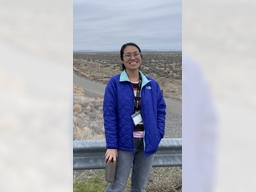Colloquium: Dr. Victoria Xu | MIT Kavli Institute
In-Person PHYS 401
Location
Physics : 401
Date & Time
February 28, 2024, 11:00 am – 12:00 pm
Description
TITLE: "Expanding our gravitational view of the Universe with quantum interferometry”
ABSTRACT: From atom interferometry to laser interferometry, experiments are leveraging quantum mechanics to expand our gravitational view of the Universe. For atom interferometry, I’ll describe the long coherence times we have realized for cold atoms trapped in distant quantum superposition states, and show how such trapped interferometers uniquely enable new fundamental physics tests. For laser interferometry, I will describe how quantum enhancement is increasing the sensitivity of kilometer-scale gravitational wave (GW) observatories, and showcase the profound impacts of quantum metrology for GW astronomy. The Laser Interferometer Gravitational-wave Observatory (LIGO) operates at the limit of quantum noise to detect gravitational waves (GWs) from cataclysmic cosmic events, such as mergers of black hole and neutron star binaries. Such extreme events produce minute ripples in spacetime that propagate across our Universe, and briefly move our mirrors by a mere 0.000000000000000001 meters, just thousandths of the radius of a proton. To detect such small movements, the quantum nature of light fundamentally limits detector sensitivity, bounding how far we can see into the Universe with GWs. I will describe recent upgrades to our squeezer system at LIGO, which has overcome quantum back-action to reduce quantum noise across nearly the full astrophysical signal band from 10 Hz - 5 kHz. For the ongoing fourth observing run of LIGO, this broadband quantum enhancement increases detection rates by over 65%, bringing GW detection rates from near-weekly to near-daily– just 9 years after the dawn of GW astrophysics. This is just the beginning of what quantum engineering can offer for fundamental physics, with applications from probing the macroscopic limits of quantum mechanics, to expanding the quantum-limited horizons of gravitational-wave astronomy.
ABSTRACT: From atom interferometry to laser interferometry, experiments are leveraging quantum mechanics to expand our gravitational view of the Universe. For atom interferometry, I’ll describe the long coherence times we have realized for cold atoms trapped in distant quantum superposition states, and show how such trapped interferometers uniquely enable new fundamental physics tests. For laser interferometry, I will describe how quantum enhancement is increasing the sensitivity of kilometer-scale gravitational wave (GW) observatories, and showcase the profound impacts of quantum metrology for GW astronomy. The Laser Interferometer Gravitational-wave Observatory (LIGO) operates at the limit of quantum noise to detect gravitational waves (GWs) from cataclysmic cosmic events, such as mergers of black hole and neutron star binaries. Such extreme events produce minute ripples in spacetime that propagate across our Universe, and briefly move our mirrors by a mere 0.000000000000000001 meters, just thousandths of the radius of a proton. To detect such small movements, the quantum nature of light fundamentally limits detector sensitivity, bounding how far we can see into the Universe with GWs. I will describe recent upgrades to our squeezer system at LIGO, which has overcome quantum back-action to reduce quantum noise across nearly the full astrophysical signal band from 10 Hz - 5 kHz. For the ongoing fourth observing run of LIGO, this broadband quantum enhancement increases detection rates by over 65%, bringing GW detection rates from near-weekly to near-daily– just 9 years after the dawn of GW astrophysics. This is just the beginning of what quantum engineering can offer for fundamental physics, with applications from probing the macroscopic limits of quantum mechanics, to expanding the quantum-limited horizons of gravitational-wave astronomy.
